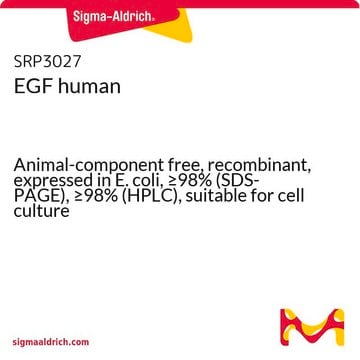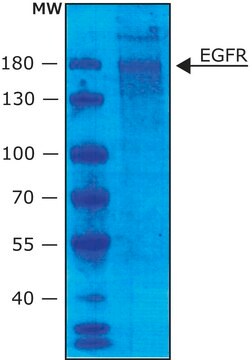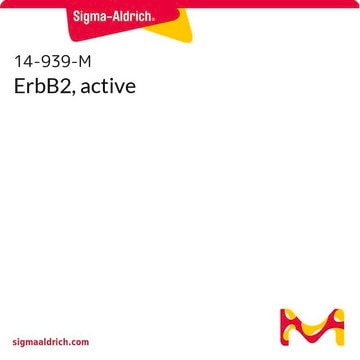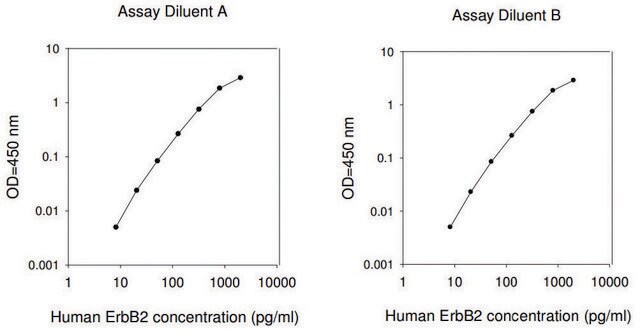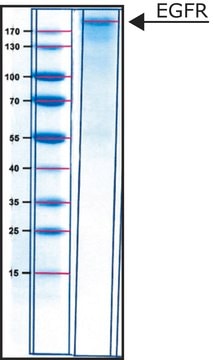SRP6214
EGF Receptor human
recombinant, expressed in CHO cells, ≥95% (SDS-PAGE)
Synonym(s):
ErbB1
Sign Into View Organizational & Contract Pricing
All Photos(1)
About This Item
UNSPSC Code:
12352200
Recommended Products
biological source
human
recombinant
expressed in CHO cells
assay
≥95% (SDS-PAGE)
form
lyophilized powder
mol wt
97.5 kDa
impurities
<1 EU/μg endotoxin (LAL test)
UniProt accession no.
shipped in
wet ice
storage temp.
−20°C
Gene Information
human ... EGFR(1950)
General description
EGF Receptor (EGFR, ErbB1) is a transmembrane protein that exerts tyrosine kinase activity upon ligand induced activation. EGFR can be activated by binding EGF or at least six other structurally related protein ligands, including TGFα, HBEGF, βcellulin (BTC), Amphiregulin, Epiregulin, and Epigen. Upon activation, EGFR initiates a signaling cascade which includes dimerization and internalization, tyrosine phosphorylation, DNA synthesis of target genes, and, ultimately, cell proliferation. EGFR signaling plays a role in the growth and differentiation of normal cells, but elevated EGFR activity is correlated with the development and pathogenesis of certain cancers. Recombinant soluble human EGFR is a 621 amino acid glycoprotein comprising the extracellular domain of EGFR, and migrates at an apparent MW of 97.5 kDa by SDS-PAGE analysis under reducing conditions.
Physical form
Sterile filtered through a 0.2 micron filter. Lyophilized from 10 mM Sodium Phosphate, pH 7.5.
Reconstitution
Centrifuge the vial prior to opening. Reconstitute in water to a concentration of 0.1-1.0 mg/mL. Do not vortex. This solution can be stored at 2-8°C for up to 1 week. For extended storage, it is recommended to further dilute in a buffer containing a carrier protein (example 0.1% BSA) and store in working aliquots at -20°C to -80°C.
Storage Class
10 - Combustible liquids
wgk_germany
WGK 1
flash_point_f
Not applicable
flash_point_c
Not applicable
Certificates of Analysis (COA)
Search for Certificates of Analysis (COA) by entering the products Lot/Batch Number. Lot and Batch Numbers can be found on a product’s label following the words ‘Lot’ or ‘Batch’.
Already Own This Product?
Find documentation for the products that you have recently purchased in the Document Library.
Our team of scientists has experience in all areas of research including Life Science, Material Science, Chemical Synthesis, Chromatography, Analytical and many others.
Contact Technical Service
